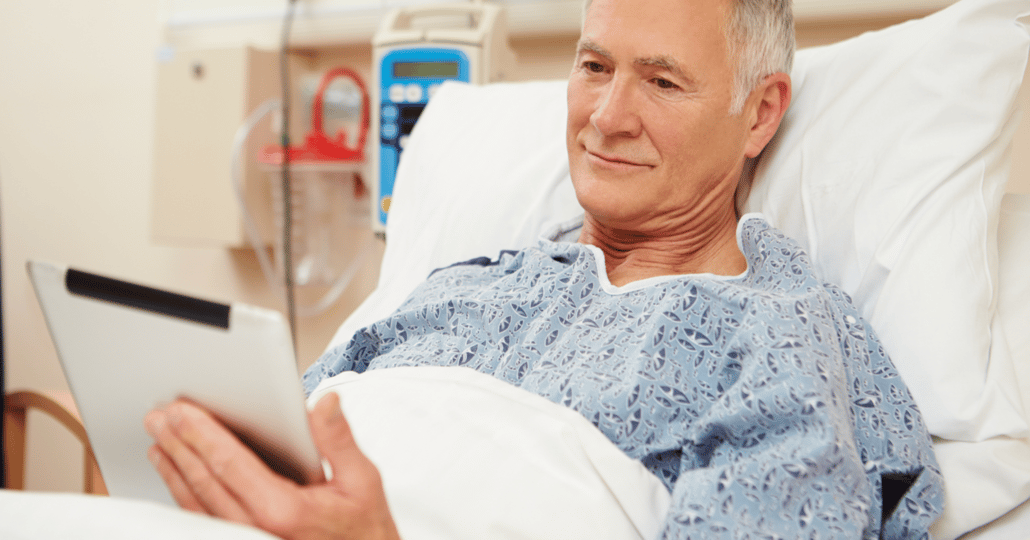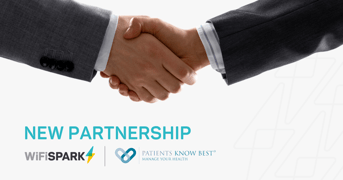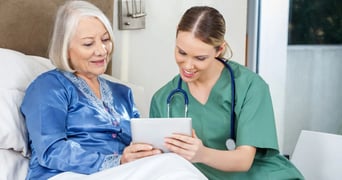The BYOD Engagement Solution: Why is it Important in Healthcare?
5 minute read | 20/04/2023

BYOD engagement solutions are the latest trend in healthcare that has been adopted by many hospitals. BYOD stands for "bring your own device" and it refers to the use of personal devices within a healthcare environment by employees or patients.
A complete solution allows for entertainment, information, engagement, and clinical services to be accessible anywhere within the healthcare setting via a secure and fully supported WiFi network.
For patients: BYOD solutions allow patients and visitors to access the internet, social media, games, TV, digital magazines, lifestyle apps and more, using their own device. They can also access any other applications that have been made available over the network which may be specific to their healthcare or hospital, such as appointment check in or recovery videos.
For staff: Having specialist information available at their fingertips, staff are able to access their clinical applications, save time and improve their day-to-day task efficiency. They are also able to utilise the entertainment facilities just like the patients and visitors.
Since a vast majority of people in the UK own a smartphone or tablet, it’s only right that patients, visitors, and staff, are able to access resources, entertainment, and engagement services from a device they already know and use, without the risk of security or data breaches.
There's a lot of talk about BYOD (Bring Your Own Device) and how it can help organisations, particularly healthcare. But what does it really mean and why is it important? Let's look at the following in more detail:
- Improve the Patient Experience
- Significant Cost Savings
- Higher Engagement & Usability
- Reduce Spread of Infection
Improve the Patient Experience
As an example, patients can use their own device to access medical records or important updates regarding their healthcare journey, such as test results or diagnosis. This allows them to be more involved in the care process and gives them greater independence when it comes to scheduling appointments when necessary or communicating with their physicians. It’s proven that more engaged patients recover quicker and are less likely to return to hospital.
BYOD can also help enhance the patient experience by allowing healthcare professionals to access patient information quickly and easily, reducing wait times, and providing more personalised care. Better informed patients will feel more at ease and will be less likely to ask questions if they feel they've been provided with the reassurance they required.
Keeping in touch with loved ones during time spent in hospital is also a crucial factor to improving the patient experience. Being able to message or video call a friend or family member at such a lonely and vulnerable time can greatly improve mental wellbeing and provides a sense of home comfort and normality.
The SPARK® Media platform connects the patient to others over WiFi where they can access video calling apps for free and doesn’t use their data or minutes. It also hosts other applications such as Freeview TV, puzzle games, online news and magazines and so much more.
Significant Cost Savings
Hospitals can save money on purchasing medical devices and hardware by allowing healthcare professionals to use their own devices.
For example, instead of providing each healthcare professional with a dedicated tablet or smartphone, they can use their own personal devices to access medical records and communicate with patients or keep occupied on their breaks.
It’s important to implement strict security measures to ensure patient data remains safe and secure when doing so - something that SPARK TSL is able to manage and provide within their service.
BYOD can reduce the costs involved with supporting and maintaining hardware and software since healthcare professionals are responsible for the maintenance of their own devices.
SPARK TSL can however, offer a tablet solution where Trusts purchase a certain number of tablets, and we provide the mobile device management (MDM) and security measures involved. That way, the Trusts are offering digital inclusivity by enabling patients to access engagement and entertainment services whether they have their own device or not – which may be the case for elderly patients.
Nevertheless, it is encouraged that patients do bring their own device with them to hospital to remain informed, engaged, and entertained during their stay, and will be responsible for maintaining and looking after their own mobile or tablet.
With a typical tablet device starting at around £300, plus the costs to maintain and support it, there are clear financial benefits when it comes to patients using their own.
Higher Engagement & Usability
BYOD creates higher engagement and usability by providing healthcare professionals and patients with greater convenience, flexibility, and personalisation.
Allowing people to use a device they are familiar with rather than Trust-provided reduces the need to learn how to use new technology.
BYOD can provide healthcare professionals with greater mobility, allowing them to access patient information and perform work-related tasks from anywhere. This can increase engagement by enabling healthcare professionals to work in a way that suits their preferences and schedules - ultimately providing better patient care.
Patients are also able to use the applications they are familiar with whilst being in an unfamiliar environment, making them feel more comfortable during their health journey as they can access any resources they need to and remain connected to the outside world.
Reduce Spread of Infection
Using your own device reduces the need for staff to share other devices such as computers, tablets or phones. This can reduce the risk of infection transmission through contaminated surfaces or shared devices.
With that, Hospital staff are more likely to clean their own devices regularly, as they have a personal investment in keeping them clean and functional. Regular cleaning of personal devices can help prevent the transfer of bacteria and viruses from the device to the staff member's hands and vice versa.
BYOD can facilitate digital communication between healthcare professionals and patients, reducing the need for in-person interactions. This can reduce the risk of infection transmission by limiting the number of face-to-face interactions.
Overall, BYOD is an effective solution for healthcare environments and is widely encouraged. It is a great way for healthcare providers to change their practices for the better.
Combined with a hardware solution, a BYOD engagement solution ensures that everyone in hospital is catered for. If someone doesn’t have their own device, it is more difficult for them to access entertainment and engagement resources at the bedside.
This is where SPARK® Horizon comes in - SPARK TSL's new and improved bedside unit. Designed to replace outdated patient-pay models currently within Hospital and provides patients with applications that mirror a person’s own device, for free. Download the brochure.
Prioritise Patient Engagement with SPARK® Media
SPARK TSL works in partnership with 80+ NHS hospitals across the UK to encourage better patient experience, increase efficiencies, and save money. SPARK® Media is accessible on any WiFi enabled device meaning patients can enjoy the entertainment from their own devices for ease and comfort.
Click below to discover more benefits of this SPARK® solution.
About the author
Ria Stevens
From helpful strategies to benefits of WiFi and patient engagement solutions, check out articles written by our Brand & Communications Specialist, Ria Stevens, for all the latest industry and SPARK TSL news.
More articles by the author
Related articles
 Company News
Company News
SPARK TSL Partners with Patients Know Best
SPARK TSL is delighted to announce partnership with Patients Know Best (PKB), a social enterprise and ...
 The SPARK Solution
The SPARK Solution
We Can Help Trusts Achieve Goals to Become a Paperless Industry
Many organisations in this day and age have a vision to become completely paperless – not only will this be a ...
 Company News
Company News
SPARK TSL signs deal with Autumna to reduce hospital readmissions
SPARK TSL is excited to announce a partnership with Autumna that, through a new app on its SPARK® Media ...


